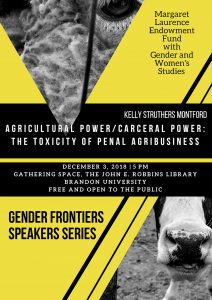
- This event has passed.
Guest speaker: ‘The toxicity of penal agribusiness’
Event Navigation
 The Gender Frontier Speakers Series presents Dr. Kelly Struthers Montford, from the University of Toronto, who will speak at the BU campus about prison farms and prison farm labour.
The Gender Frontier Speakers Series presents Dr. Kelly Struthers Montford, from the University of Toronto, who will speak at the BU campus about prison farms and prison farm labour.
As well, Dr. Struthers Montford will be giving a guest lecture in Dr. Ariane Hanemaayer’s fourth-year honours seminar in “Critical Sociology” to discuss the public applications of her research as Senior Advisor to the Independent Expert on Human Rights and Corrections regarding the implementation of an Ontario Human Rights Commission consent order. In this role, she advises and oversees the provincial correctional system in reforming their use of solitary confinement, especially for women and those with mental health concerns.
Dr. Struthers Montford’s research complements both the historical and social sciences focuses in Brandon University’s Gender and Women’s Studies program. Her research engages with key conceptual and theoretical intersections between marginalized populations, regulation, and the politics of food production, with particular emphasis on the role of power across a variety of sites of practice.
The program, faculty, and students will benefit from her visit by engaging with the intersections between post-colonial, eco-feminist, and criminological theories by examining prison policy.
Further, given Dr. Struthers Montford’s historical focus, her research talk will contextualize the emergence of two seemingly different institutions, agriculture and the prison, within the broader social, cultural, economic, and political conditions under which the prison farm emerged.
About the public talk:
Agricultural power/carceral power: The toxicity of penal agribusiness
Animal agriculture is a leading cause of ecological toxicity, and prisons are toxic sites in multiple ways. Penitentiary-based agriculture is integral to penal regimes as it coalesces around land, labour, rehabilitation, as well as food production and supply. The 2010 closure of animal agriculture in Canadian federal institutions marks a small hiatus in an otherwise longstanding practice predating confederation. With the re-opening of two penitentiary farms as goat-dairies, I propose that we consider the carcerality of imprisonment and of animal agriculture as a multi-species carceral practice with devastating environmental and relational impacts. I propose four tenets that render multi-species carcerality intelligible: colonial tactics of enclosure; de-animalization; alienated/exploitative labour; and, toxicity and ontological constraint. By thinking together colonialism and anthropogenic climate change using the prison farm, I show that penal agribusiness is a racialized and colonial institution with social, political, and ecological ramifications exceeding the geographical constraints of the prison.
About the speaker:
Kelly Struthers Montford is a Postdoctoral fellow in Punishment, Law, and Social Theory at the Centre for Criminology & Sociolegal Studies at the University of Toronto. She holds an Honour’s Bachelors of Social Sciences with a Specialization in Criminology from the University of Ottawa, as well as a Master’s of Arts in Sociology from the University of Alberta where she focused on feminist criminology. She also holds a PhD in Sociology from the University of Alberta where her research focused on socio-legal studies and critical theory. She has previously been a Killiam Scholar, SSHRC Canada Graduate Scholar, and the 2013-2014 Institute for Critical Animal Studies Hilda Scholar of the year. Her research interests include critical prison studies, critical animal studies, philosophy, and social theory. With Dawn Moore, she has recently published an article in New Criminal Law Review on the politics of recognition and Indigenizing the prison. Her work has been published in philoSOPHIA: A Journal of Continental Feminism, the Canadian Journal of Women and the Law, Societies, and the PhaenEx Journal of Existential and Phenomenological Theory and Culture, as well as in various edited collections.
This talk is funded by the Margaret Lawrence Endowment Fund with Gender and Women’s Studies.
Brandon University is committed to being an accessible institution. To ensure that any event is available to all who are interested in attending, please advise us in advance of any accessibility considerations. Accessibility contact: communications@brandonu.ca


